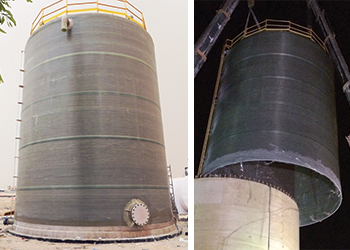Al Johi builds ‘biggest’ single-piece FRP tank
01 January 2016
Dammam-based M Al Johi Fibreglass, which claims to have manufactured and installed the largest single-piece fibreglass tank in the Middle East, has disclosed plans of building even bigger ones in the region.
The company built the giant tank for the Ministry of Water and Electricity at Nariyah, near Jubail in Saudi Arabia. The tank, which has a capacity of 500 cu m (500,000 litres), has a diameter of 8 m and a height of 10 m, and the project took three months to complete.
Chief consultant Shahid Ahmed points out that for large-capacity projects, clients currently use concrete, steel or FRP (fibre-reinforced plastic) tanks. “By using our tanks, the client can rest assured that they will not need to stop their projects for maintenance work every three to five years. Also, our tanks has a life expectancy of more than 50 years.”
Shahid reveals that the giant FRP storage tank at Nariyah was manufactured using filament winding technology. “We hope this pioneering project will help us break the stranglehold that steel and concrete tanks have in the market. We also have a technical collaboration with a Korean consulting and engineering firm which helps us undertake complex projects.”
Now, the company has bid for a chemical plant project in Qatar which will be 10 times bigger than what it has done in Saudi Arabia. This tank will have a capacity of 5,890 cu m (5.89 million litres), with a diameter of 25 m and height of 12 m, Shahid says.
Among other contracts, M Al Johi Fibreglass is currently working on a water treatment plant in Saudi Arabia for Maaden, where it is manufacturing two “unique and challenging” tanks. These include a 250,000-litre horizontal FRP tank with a diameter of 3.4 m and length of 25 m, and a 68,000-litre rectangular tank which will be 5 m long, 2.5 m wide and 5.4 m high, says Iftikar Ahmed, the project’s consultant.
M Al Johi Fibreglass, which was established in 2000, celebrated 15 years of operations last year. Its factory is based in Al Khaleej Industrial Area in Dammam and produces water and chemical tanks, manholes, portable chemical toilets, GRP (glass-reinforced plastic) liners and other custom-made products.
In Bahrain, it has a partner company, IES Alliance for Management of Industrial Projects, which was established in 2007 in Hidd.
Outside the region, it has a company in Dhaka, Bangladesh, known as Reliance Fibreglass, which was set up in 2012 to manufacture FRP biogas digester tanks for Grameen Shakti as a part of its social business endeavour with Nobel laureate Dr Mohammed Yunus.
M Al Johi Fibreglass has also entered into technical collaboration with research universities in the Far East for implementing biogas projects. “We have technical and engineering collaborations with Energuard Engineering of South Korea, and a business partnership with Locwid and Shonghe in China,” says Iftikar.
In addition to fibreglass, M Al Johi Fibreglass has sister companies that are involved in general trading, fire safety equipment and confectionery. It employs 35 people in Saudi Arabia and Bahrain for its fibreglass operations while a total of 90 are on its rolls for all its companies.
Commenting on business over the past year, Khalid Ahmed, business development manager of IES Alliance, says: “Business has been very good and we are improving in our activities and operations but as always in the business world, we have to continuously adapt to new challenges that arise every day.”
Two major macroeconomic effects, he says, are the low global oil prices leading to restrictive government spending on infrastructure development, and the labour market rules and regulations in Saudi Arabia.
Nevertheless, Khalid strongly believes that ultimately to sustain the economy, GCC states will have to increase spending on infrastructure projects, and that cutbacks will be only for the short term as governments try to find alternate sources of funding.
He reveals that the company plans to diversify into multiple fibreglass products and is tying up with several international companies which offer complementary products.
Furthermore, the company is planning to set up its second manufacturing facility in the Middle East, which will be located in Bahrain. The composite factory will be involved in the manufacture of artificial marble, solid surfaces, granite, onyx and fibreglass products for use in industrial, commercial and residential buildings and projects.
It also plans on achieving Underwriters Laboratories (UL) certification for its fuel and chemical storage tanks.
Meanwhile, to reach out to more customers and raise awareness about its products and services, Khalid says the company is planning to participate in exhibitions and conferences in the Middle East which are related to the construction industry.
Looking at future prospects, Shahid predicts that demand for FRP products will grow or remain stable. “This is because there are a lot of development projects currently under way,” he says.



